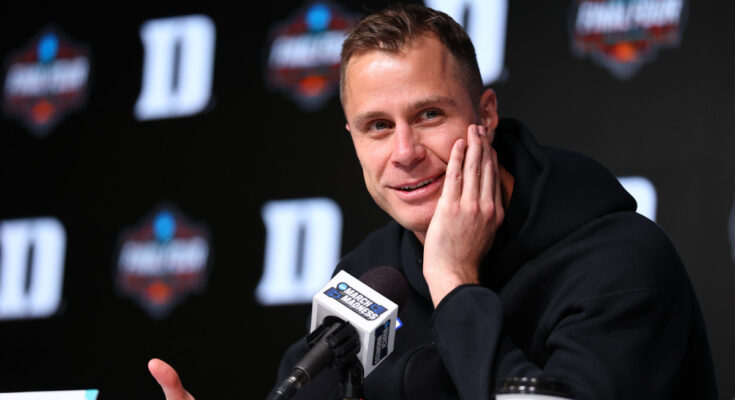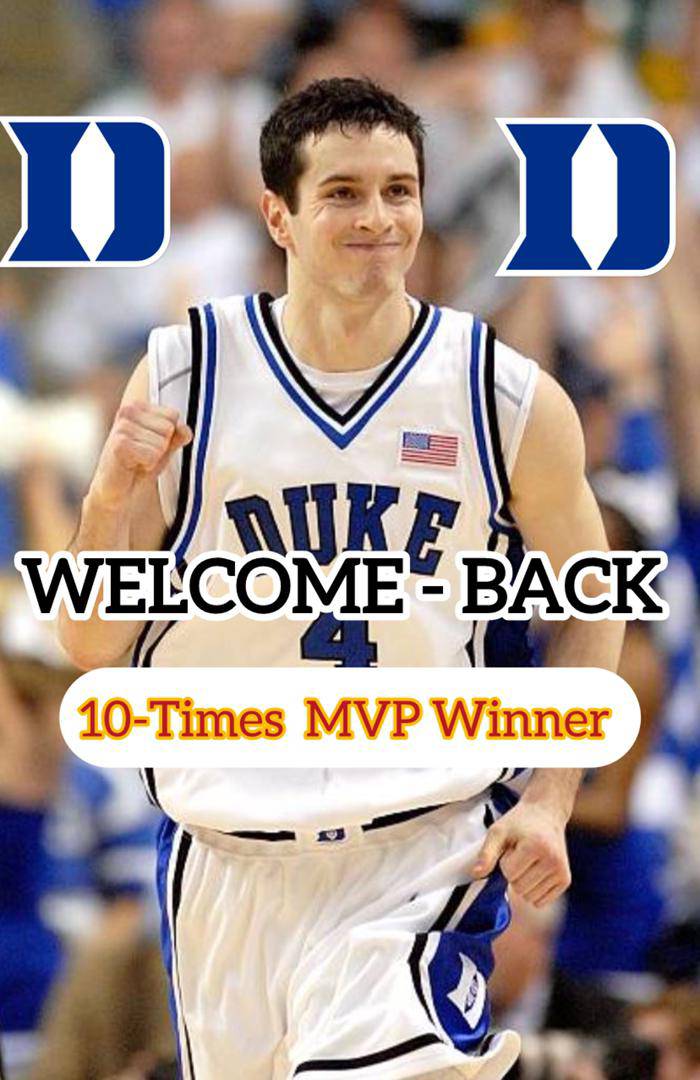BREAKING: Duke Basketball Takeaways — With Cooper Flagg Headed to the NBA, Jon Scheyer Opens Up on What’s Next
The world of college basketball is buzzing with news that Duke’s rising star, Cooper Flagg, is officially entering the NBA Draft. For a program known for producing NBA talent, this is hardly unexpected, yet it marks a pivotal moment for the Blue Devils. With Flagg’s departure, questions swirl about how Duke will adapt, rebuild, and keep its elite standing. At the heart of those questions lies Duke’s head coach, Jon Scheyer, who recently sat down to talk candidly about the team’s future, the challenges ahead, and the exciting prospects waiting in the wings.
Cooper Flagg’s decision to declare for the NBA Draft was a headline-grabber that resonated far beyond Durham, North Carolina. Flagg, a player whose combination of size, skill, and versatility made him a force on the court, was seen as a cornerstone for Duke’s present and future. His departure leaves a void not only in the roster but also in leadership and on-court dynamics. Yet, as any great program knows, college basketball is a revolving door, and Duke is no stranger to handling transitions with grace and strategic savvy.
Jon Scheyer, stepping into one of the most pressure-filled coaching jobs in college basketball, took this moment as an opportunity to reinforce his commitment to the program’s identity and future success. In his conversation about what’s next, Scheyer emphasized resilience, adaptability, and a clear vision rooted in Duke’s rich tradition. He acknowledged the challenge but also expressed confidence that the team is well-positioned to move forward.
Scheyer’s outlook on the post-Flagg era is grounded in a realistic yet optimistic approach. He recognized the immediate impact Flagg had on the team but also stressed that basketball is a team sport, and success depends on collective effort, not just individual talent. He spoke about the need for returning players to step up, grow into leadership roles, and embrace greater responsibilities both on and off the court. This philosophy highlights a crucial aspect of Duke basketball — cultivating not just great players but great leaders.
One of the key takeaways from Scheyer’s reflections is his focus on development. With Flagg gone, the spotlight turns to those players who are still on the roster, many of whom are hungry to prove themselves. Scheyer underscored the coaching staff’s dedication to developing every player’s skills, improving their basketball IQ, and preparing them for the intensity of ACC competition. This internal growth is essential to sustaining Duke’s competitiveness amid roster changes.
Recruitment, of course, remains another major pillar in Duke’s strategy. Scheyer reiterated Duke’s commitment to attracting top-tier talent nationally and internationally. Despite the challenges of replacing a player like Flagg, Duke’s allure as a destination for elite prospects remains undiminished. Scheyer highlighted how the program’s emphasis on player development, NBA pathways, and academic excellence continues to resonate with recruits. This recruiting pipeline is critical to Duke’s ability to reload effectively and maintain a high level of play year after year.
What makes Scheyer’s approach particularly interesting is his openness about embracing new tools and trends in college basketball. The transfer portal, for example, is now a key resource for programs looking to fill gaps quickly, and Scheyer did not shy away from discussing how Duke intends to leverage this to bolster the roster. Bringing in experienced players who can contribute immediately adds depth and maturity, which is invaluable during transition periods.
Beyond tactics and strategy, Scheyer also touched on the emotional and cultural aspects of this transition. Losing a player like Cooper Flagg is more than just losing points on the scoreboard; it’s about losing a teammate, a leader, and a personality who helped define the team’s spirit. Scheyer stressed the importance of fostering a tight-knit community where players support one another, develop strong bonds, and uphold the values that make Duke basketball special. This culture is a key ingredient in weathering the uncertainties of roster turnover.
Moreover, Scheyer’s candidness about challenges sets a tone of transparency and trust with fans and the basketball community. He didn’t pretend that losing a player of Flagg’s caliber is easy, but he reframed it as an opportunity — a chance to discover new leaders, develop fresh talent, and reinforce Duke’s commitment to excellence. This narrative of opportunity rather than setback is crucial for maintaining morale and focus.
Scheyer’s vision for what’s next also includes a renewed emphasis on team identity. With new pieces coming in and old ones stepping up, he talked about the need to establish a style of play that reflects Duke’s strengths and competitive spirit. This involves not only on-court tactics but also instilling a mindset of toughness, discipline, and selflessness. It’s a holistic approach that goes beyond X’s and O’s, aiming to build a team that thrives under pressure and adapts fluidly to challenges.
Looking ahead, Scheyer is clearly optimistic about Duke’s trajectory. He pointed to the promising talent already on campus, exciting incoming recruits, and a coaching staff committed to excellence. While acknowledging that the road ahead will have bumps, he is confident that Duke’s foundation is solid and that the Blue Devils will continue to be a force in college basketball.
Fans and analysts alike will be watching closely as Duke navigates this new chapter. With Cooper Flagg moving on to the NBA, the spotlight now shines on the players and leaders who will carry the program forward. Jon Scheyer’s steady hand and clear vision provide reassurance that Duke’s tradition of success is in capable hands. His recent comments reveal a coach who is not just reacting to change but proactively shaping the future.
In essence, this moment of transition encapsulates the enduring nature of college basketball itself — a dynamic, ever-changing sport where talent comes and goes but the spirit of the program remains. Duke basketball’s next chapter is being written now, with Jon Scheyer at the helm, ready to steer the team through uncertainty toward renewed glory.
As the season approaches and the new roster takes shape, excitement builds around the possibilities. How will the returning players respond? Which newcomers will make an immediate impact? What adjustments will Scheyer and his staff implement to stay ahead in the fiercely competitive ACC? These questions add to the intrigue and anticipation surrounding Duke basketball.
One thing is certain: Jon Scheyer’s leadership and the resilience of the Blue Devils will be tested, but the program’s history of excellence and adaptability offers a strong foundation. With strategic recruitment, player development, and a commitment to culture, Duke is poised not only to recover from the loss of Cooper Flagg but to thrive in the seasons ahead.
The conversation with Jon Scheyer made it clear that while the departure of a star player like Flagg is significant, it is far from the end of Duke’s story. Instead, it’s a new beginning — a chance to redefine, rebuild, and reclaim a place at the top of college basketball’s elite. The Blue Devils have faced adversity before and emerged stronger, and with Scheyer guiding the way, the program’s best days may still be ahead.



